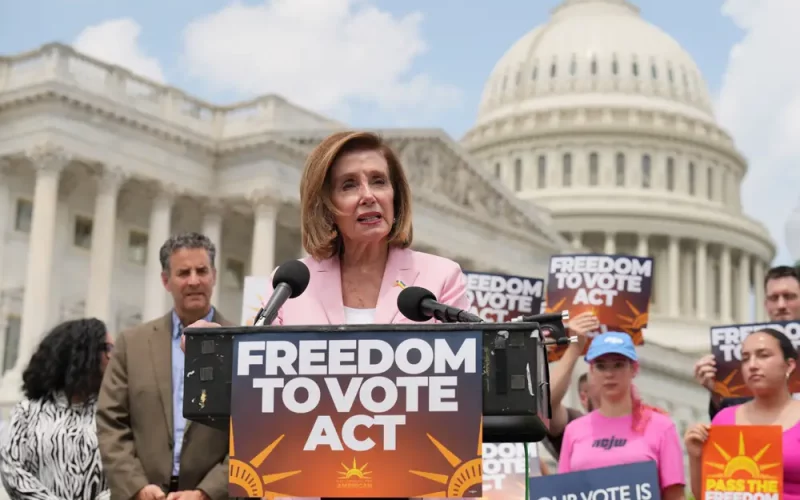On Monday, a federal appeals court ruled against a crucial instrument used to enforce the Voting Rights Act, setting up another Supreme Court battle over the civil rights era legislation.
The 8th US Circuit Court of Appeals found in a case arising from an Arkansas redistricting issue that private entities cannot sue under a component of the legislation known as Section 2. If upheld, the ruling will significantly diminish what remains of the Voting Rights Act, which was enacted in 1965 to combat racial discrimination in elections.
The court ruled 2-1 that the “text and structure” of the Voting Rights Act demonstrate that Congress did not provide private litigants the jurisdiction to sue. The appellate panel upheld a 2022 judgment by a Trump-appointed federal judge in Arkansas that said Section 2 litigation could only be filed by the US Justice Department.
However, such decision contradicts decades of legal precedent.
The vast majority of cases brought under the Voting Rights Act, which prohibits election rules that have the intent or effect of discriminating on the basis of race, are brought by private plaintiffs, with the Justice Department facing limited resources and other considerations that limit the number of such cases it files to a few each year at most.
“Eliminating individual people’s right to sue under Section 2 of the Voting Rights Act runs contrary to settled law, common sense and any basic concept of fairness: when the government discriminates against people, they should have a right to fight back in court,” Paul Smith, senior vice president of the nonpartisan Campaign Legal Center, said in a statement.
The center had filed a friend-of-the-court brief in the case, claiming that private litigation are vital to implementing the Voting Rights Act.
The US Justice Department’s voting section, which enforces federal voting rules, simply does not have enough lawyers “to be everywhere in the country at once,” according to David Becker, executive director of the Center for Election Innovation & Research. During the Clinton and Bush administrations, he served as an attorney in the Department of Justice’s voting unit.
“That’s why over the course of over 50 years, private plaintiffs have also brought those cases so that residents of a small county in Arkansas are just as well protected as residents of the entirety of the state of California,” he added.
The dispute at hand revolves around a challenge to Arkansas’ state House map made by the Arkansas NAACP chapter and the Arkansas Public Policy Panel.
Arkansas, Iowa, Minnesota, Missouri, Nebraska, North Dakota, and South Dakota are among the seven states covered by the 8th Circuit. And it comes as the presidential race for 2024 heats up.
Since the 2020 presidential election, voting methods around the country have been the focus of heated political conflicts. Former President Donald Trump has erroneously and often alleged that election fraud had a role in his defeat.
Arkansas Attorney General Tim Griffin, a Republican, praised Monday’s decision, saying it will help to reduce “meritless” challenges to states’ decisions on how to create legislative districts and conduct elections.
“For far too long, courts across the country have allowed political activists to file meritless lawsuits seeking to seize control of how states conduct elections and redistricting,” he said in a statement. “This decision confirms that enforcement of the Voting Rights Act should be handled by politically accountable officials and not by outside special interest groups.”
An appeal of Monday’s decision might be heard by the whole 8th Circuit. However, the case is likely to come up before the Supreme Court, in part because a panel from another appellate court, the 5th Circuit Court of Appeals, recently reached a different decision.
In a high-profile redistricting case this year, the US Supreme Court confirmed the use of Section 2 of the Voting Rights Act in ordering the state to redesign its congressional map to ensure more political influence for Black voters.
Many legal observers were surprised by the decision, given that the high court weakened the law in 2013 by defanging a separate provision of the law that determined which states needed approval from the US Department of Justice or a federal court before making changes to their voting procedures or election laws.


All corpoRATe nonsense!!!
Maritime law does Not pertain to the American REPUBLIC!!! AMEN
ONLY to the CorpoRATion known as USAinc. Which is NOT the American nationals government.
FACT
“Former President Donald Trump has erroneously and often alleged that election fraud had a role in his defeat.”
What dummy this? It is not clear from reading the article. Anyone with half a brain knows the election was stolen.